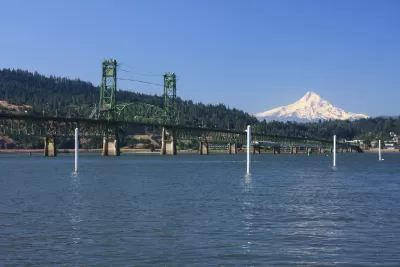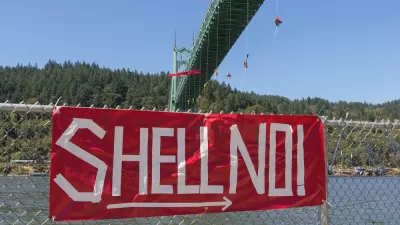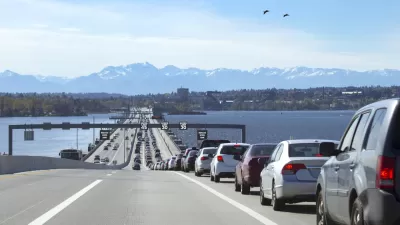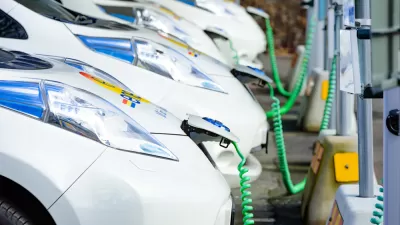The package, which doesn't tax walking and running shoes, went to the legislature on June 30. It includes a ten cents per gallon gas tax, a 0.10 percent payroll tax, a $15 tax on new bikes costing at least $200, and a potential toll on I–205.

"The plan will raise nearly $3 billion in taxes and fees over the next eight years," reports Pat Dooris for KGW–TV. In addition to the gas tax, bike tax, payroll tax, and potential toll, HB 2017 raises motor vehicle registration fees and adds "a tax on car sales that will fund rebates for purchases of electric cars," reports Gordon R. Friedman for The Oregonian, who indicates that a "tentative deal" had been reached on June 28 between Democratic Gov. Kate Brown and the Democratic-controlled legislature.
"The payroll tax would fund a statewide account for public transportation," adds Dooris. "It would help push buses into more rural areas and allow small towns to create more robust public systems, according to Rep. Cliff Bentz, a Republican from Ontario and State Senator Lee Beyer, (D) Springfield."
Gas tax revenues, which can't be spent on public transit due to constitutional restrictions, would pay for road and bridge projects. Highway widenings are notably mentioned to reduce congestion, including adding a lane in each direction to "Interstate 205 and the Abernethy Bridge which carries I-205 across the Willamette River in Oregon City," adds Dooris.
“More likely we’re probably looking at some tolling on 205 as a way to have to do that,” said Beyer. “That decision has not been made but it’s a likelihood. It’s a very expensive projects and within existing money we don’t have money to do that."
The Abernethy Bridge would be replaced, according to Friedman of The Oregonian. He provides more details on how the bipartisan consensus was reached on the bill and a related issue, the state's low-carbon fuel standard, or "clean fuels" law.
Future of Landmark Road Usage Charge?
OReGO, the nation's only actual vehicle-mile-traveled fee (called a road usage charge) program, is now two-years old, having begun operation on July 1, 2015 for up to 5,000 volunteer motorists who are charged 1.5 cents per mile driven, and credited the state gas taxes they paid at the pump. California and Colorado have completed trial programs, and Washington and Hawaii are expected to start pilots soon.
HB 2017 "would set up a system to charge vehicles that do not run on gas, a fee based on the miles they travel each year," adds Dooris, suggesting OReGO could morph into a mandatory program only for electric vehicles that lack gas tanks. If so, this would be a more equitable way to charge EV motorists than is currently done by many states that charge a flat, annual registration fees of $100–$200 for electric vehicles [see EV fees] and many even for hybrid vehicles even though they are not plug-in vehicles.
If the transportation legislation is passed in its current form and signed by Gov. Brown, Oregon will become the eighth state (after West Virginia) this year to increase its gas tax. Perhaps more significantly, it will also add to the "firsts" for the Beaver State when it comes to state transportation funding:
- First to charge a gas tax in 1919.
- First to operate a road usage charge in 2015.
- First to charge a bike tax.
Hat tips to AASHTO Daily Transportation Update and Elliot Njus, The Oregonian.
FULL STORY: Transportation bill would collect $3 billion in taxes, fees

Planetizen Federal Action Tracker
A weekly monitor of how Trump’s orders and actions are impacting planners and planning in America.

San Francisco's School District Spent $105M To Build Affordable Housing for Teachers — And That's Just the Beginning
SFUSD joins a growing list of school districts using their land holdings to address housing affordability challenges faced by their own employees.

The Tiny, Adorable $7,000 Car Turning Japan Onto EVs
The single seat Mibot charges from a regular plug as quickly as an iPad, and is about half the price of an average EV.

With Protected Lanes, 460% More People Commute by Bike
For those needing more ammo, more data proving what we already knew is here.

In More Metros Than You’d Think, Suburbs are Now More Expensive Than the City
If you're moving to the burbs to save on square footage, data shows you should think again.

The States Losing Rural Delivery Rooms at an Alarming Pace
In some states, as few as 9% of rural hospitals still deliver babies. As a result, rising pre-term births, no adequate pre-term care and "harrowing" close calls are a growing reality.
Urban Design for Planners 1: Software Tools
This six-course series explores essential urban design concepts using open source software and equips planners with the tools they need to participate fully in the urban design process.
Planning for Universal Design
Learn the tools for implementing Universal Design in planning regulations.
Smith Gee Studio
City of Charlotte
City of Camden Redevelopment Agency
City of Astoria
Transportation Research & Education Center (TREC) at Portland State University
US High Speed Rail Association
City of Camden Redevelopment Agency
Municipality of Princeton (NJ)





























